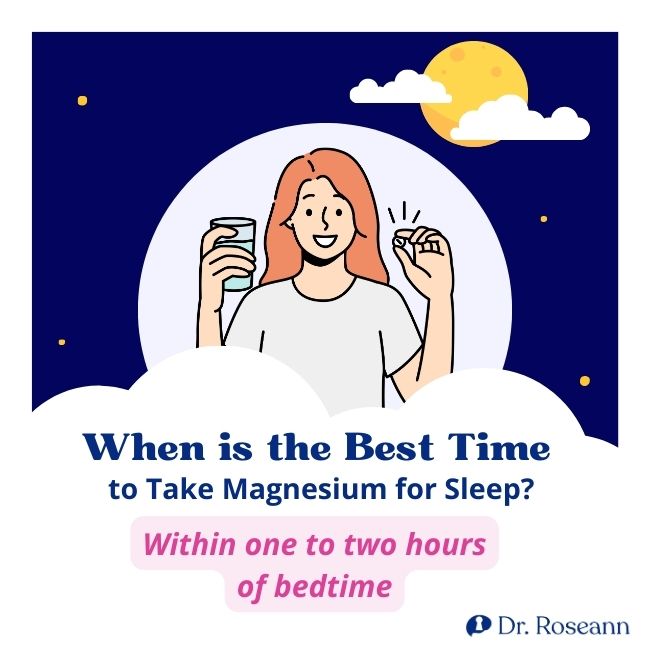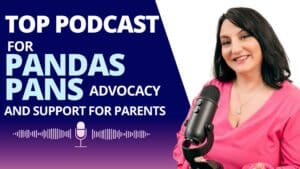If your child or teen struggles with behavioral or mental health issues like ADHD, anxiety, autism, OCD, PANS, PANDAS, or mood disorders, having long, sleepless nights is no stranger to you.
Even worse, sleep deprivation can often exacerbate their issues. Lack of sleep creates a cycle that's hard to break. Here's where the essential mineral, magnesium, comes in. Magnesium can be your child's new best friend because sleepless nights aren't fun.
Magnesium, often found in green leafy vegetables, is vital to nerve function and maintaining healthy blood pressure (National Institutes of Health [NIH], 2021). But more importantly, it also plays a crucial role in regulating sleep quality for exhausted parents and children.
How Magnesium Helps with Sleep
A good night's sleep is a symphony of hormones, neurotransmitters, and minerals that play their roles harmoniously. Magnesium is the lead performer in this sleep orchestra. You might even call magnesium the body's natural “chill pill,” given its versatile roles in promoting muscle relaxation while combating stress.
Magnesium is a critical player in the central nervous system and nerve functions, which helps control our sleep cycle (NIH, 2021). It regulates neurotransmitters, which are the brain's chemical messengers. This is how it controls the activities of the nervous system. It also inhibits the release of cortisol, the pesky stress hormone that can keep us awake at night (Sartori et al., 2012).
Let's remember magnesium's relationship with melatonin, the hormone-inducing sleep. Magnesium aids in regulating melatonin production, effectively signaling to our bodies when it's time to power down and fall asleep (Abbasi et al., 2012). Without sufficient magnesium, our bodies may struggle to transition into the sleep phase.
The interaction of magnesium with gamma-aminobutyric acid (GABA), a neurotransmitter responsible for calming nerve activity, is another considerable benefit. Magnesium acts as a gatekeeper, aiding the function of GABA receptors. As GABA levels increase, our bodies relax and prepare for sleep. Conversely, lower GABA levels have been linked to restless legs syndrome, insomnia, and other sleep disruptions (Chen et al., 2012).
Now, let's talk about Billy. Billy was a bright boy, but he was facing issues with his mood and attention due to PANDAS. So, I advised his mom to start him on magnesium supplements as we go about his other symptoms through the BrainBehaviorResetTM Program. The result? Improved sleep! As a bonus, Billy began to perform better at school too. He was more alert, focused, and, well, happier.
The Best Magnesium for Sleep
Magnesium supplements come in many forms, and navigating them can sometimes feel overwhelming. So, which one should you use to tuck your child in to ensure a good night's sleep? Two forms of magnesium stand out as potential lullaby singers in this department: magnesium glycinate and magnesium citrate.
Let's start with magnesium glycinate. It's often hailed as the gold standard of magnesium supplements for supporting sleep. Why? It's a chelated form of magnesium. That means it's attached to another molecule, in this case, glycine, that enhances its absorption in the body.
Glycine is an amino acid that has calming and sleep-enhancing properties. It's particularly effective for those with a magnesium deficiency, as it's less likely to cause laxative effects than other types. Magnesium glycinate is a strong contender for restful sleep (Abbasi et al., 2012).

Now, on to magnesium citrate, a form combined with citric acid. It also boasts good bioavailability, meaning the body can readily absorb and utilize it. Additionally, magnesium citrate is recognized for its ability to help with digestive issues. This is a welcome bonus if your child's anxiety manifests as a nervous stomach or if they struggle with constipation (Rosanoff et al., 2012).
Benefits of Magnesium for Sleep
Now that we've established the important role of magnesium in promoting sleep, let's delve a little deeper into the benefits it brings to the slumber party.
First and foremost, magnesium is your ally in the fight against insomnia. Research shows that magnesium supplementation can significantly increase sleep time and efficiency. It also reduces sleep latency, which refers to the time one needs to fall asleep. Magnesium improves sleep quality in young and older adults with insomnia symptoms (Abbasi et al., 2012).
But it's not just about quantity, as quality is essential too. Magnesium helps maintain healthy GABA levels, so your child will enjoy a long, deep sleep. Such a state is conducive to physical and mental restoration (Chen et al., 2012).
Magnesium also moonlights as a natural muscle relaxant. It regulates neuromuscular signals and muscle contractions. Magnesium helps calm the nervous system, which benefits those suffering from health conditions that cause disrupted sleep.
The role of magnesium in regulating our circadian rhythm can't be overstated. It helps regulate the body's biological clock and influences sleep-wake cycles, making it easier for your kid to stick to a regular sleep schedule (Abbasi et al., 2012).
Magnesium Deficiency and Sleep
Now, let's consider what happens when magnesium is in short supply. A deficiency in this crucial mineral can turn a sweet lullaby into a nerve-racking nightmare.
First off, it's essential to know that magnesium deficiency is a real and prevalent issue. The modern Western diet is often low in fresh fruits and vegetables but high in processed foods. As a result, many people, including children, do not get enough magnesium (Rosanoff et al., 2012). Our levels of magnesium are directly tied to our food and supplemetal sources of magnesium.
Poor sleep is one of the many direct effects of magnesium deficiency. Insufficient magnesium means the neurotransmitters that control sleep and wake cycles can go haywire. It can also affect our blood sugar levels. Melatonin production gets disrupted, leading to difficulty falling or staying asleep (Abbasi et al., 2012).
Magnesium deficiency is also associated with increased levels of stress and anxiety, which are notorious sleep disruptors. Magnesium helps the body respond well to stress. Without enough, your child might find it harder to relax and sleep (Sartori et al., 2012).
Optimal Magnesium Intake for Enhanced Sleep: How Much is Needed
When it comes to magnesium, you need to find the amount that's just right. But how much magnesium does your child need for improved sleep?
The National Institutes of Health states that magnesium's recommended dietary allowance (RDA) varies with age and sex. For children ages 4-8, the RDA is 130 mg of magnesium; for those 9-13, it's 240 mg; and for teenagers 14-18, it's 410 mg for males and 360 mg for females (Office of Dietary Supplements – Magnesium, 2021). These values, however, are the total daily magnesium recommendations for all bodily functions, not just sleep.
To supplement for better sleep, start with lower doses and gradually increase them. A commonly recommended dose of magnesium for sleep purposes is around 100-350 mg daily, but this can vary depending on individual needs and responses (Abbasi et al., 2012).
Remember, not all forms of magnesium are created equal, and the body's absorption can vary. For example, magnesium glycinate has a higher bioavailability, so less may be needed than other forms.
Always remember that introducing a popular supplement like magnesium should be done with guidance from a healthcare provider. Doing so ensures safety and efficacy. It also avoids potential side effects from high doses of magnesium, such as diarrhea or nausea.
Best Time to Take Magnesium for Sleep

Here's the million-dollar question for our sleep-deprived parents: When is the best time to introduce magnesium into your child's routine to promote better sleep? The answer is as simple as the lullaby you sing to them before bed – closer to bedtime. Let's dive into why.
Magnesium works harmoniously with our body's internal clock, which regulates various biological functions, including sleep (Abbasi et al., 2012). The body naturally releases certain hormones and neurotransmitters at a specific time of day.
As magnesium influences the release of the sleep conductor melatonin, timing is everything. As evening approaches, melatonin production ramps up. This signals our bodies that it's time to start winding down. Taking magnesium closer to bedtime supports the body's natural rhythm and aids this shift into sleep mode.
Now, one might wonder if the exact timing of magnesium intake is crucial. Should it be taken an hour before bed? Two hours? While there's no universal ‘perfect' timing, it is typically suggested to take it within one to two hours of bedtime. Doing so gives the body time to absorb the mineral and put it to work.
However, note that every child is unique. What works best for your kid may not work as well for another. Therefore, monitor your child's sleep patterns when starting new supplements. Adjust the timing as necessary.
Returning to Billy's story, his mom started giving him magnesium supplements and his bedtime routine. Aside from improved sleep, he is also more alert and focused during the day. His mom also noticed a general enhancement in his mood.
Precautions When Taking Magnesium for Sleep
Now that we've sung the praises of magnesium for sleep, it's time to add cautionary notes to the melody. While magnesium is generally considered safe, there are precautions to consider.
Firstly, like any dietary supplement, it's possible to have too much of a good thing. Overdosing on magnesium, usually from supplements rather than food sources, can lead to symptoms like diarrhea, nausea, abdominal cramping, and even more severe issues like irregular heartbeat, high blood pressure, and cardiac arrest in extreme cases. That's why it's essential to stick to the recommended dosage and seek guidance from a healthcare provider (Office of Dietary Supplements – Magnesium, 2021).
If your child has a kidney disorder, caution is warranted as the kidneys regulate the body's magnesium levels. An impaired kidney function could lead to magnesium buildup (Gröber et al., 2015).
Drug interactions are another potential issue. Magnesium may interact with certain medications, including some antibiotics, diuretics, and medicines for osteoporosis, making them less effective. If your child is on medication, ask their doctor before introducing a sleep supplement (Office of Dietary Supplements – Magnesium, 2021).
Finally, it's important to remember that supplements like magnesium are just one piece of the sleep puzzle. Good sleep hygiene, including maintaining a consistent sleep schedule, creating a calm and quiet sleep environment, and limiting screen time before bed, is equally crucial for good sleep.
While magnesium has potential benefits for sleep, it's essential to take a balanced approach and consult with a healthcare professional to ensure it's used safely and effectively. In addition, if your child has underlying behavioral or mental health issues, using other natural solutions like neurofeedback and PEMF may help. Holistic remedies are safe and effective with no negative side effects.
Parent Action Steps
- Incorporate magnesium supplements for better sleep.
- Consult with a healthcare provider for the appropriate dosage
- Include magnesium-rich foods in your child’s diet
- Establish a consistent sleep schedule for your child
- Create a calm and quiet sleep environment
- Monitor your child's sleep patterns
- Adjust the timing of magnesium intake as necessary.
- Practice good sleep hygiene
- Take our Solution Matcher to discover science-backed solutions
- Download our comprehensive guide on magnesium (insert lead magnet title).
Citations
Abbasi, B., Kimiagar, M., Sadeghniiat, K., Shirazi, M. M., Hedayati, M., & Rashidkhani, B. (2012). The effect of magnesium supplementation on primary insomnia in elderly: A double-blind placebo-controlled clinical trial. Journal of Research in Medical Sciences, 17(12), 1161-9.
Chen, H. Y., Cheng, F. C., Pan, H. C., Hsu, J. C., & Wang, M. F. (2014). Magnesium enhances exercise performance via increasing glucose availability in the blood, muscle, and brain during exercise. PloS one, 9(1), e85486. https://doi.org/10.1371/journal.pone.0085486
Gröber, U., Schmidt, J., & Kisters, K. (2015). Magnesium in Prevention and Therapy. Nutrients, 7(9), 8199–8226. https://doi.org/10.3390/nu7095388
Office of Dietary Supplements – Magnesium. (2021). NIH Office of Dietary Supplements. https://ods.od.nih.gov/factsheets/Magnesium-HealthProfessional/
Rosanoff, A., Weaver, C. M., & Rude, R. K. (2012). Suboptimal magnesium status in the United States: are the health consequences underestimated?. Nutrition reviews, 70(3), 153–164. https://doi.org/10.1111/j.1753-4887.2011.00465.x
Sartori, S. B., Whittle, N., Hetzenauer, A., & Singewald, N. (2012). Magnesium deficiency induces anxiety and HPA axis dysregulation: modulation by therapeutic drug treatment. Neuropharmacology, 62(1), 304–312. https://doi.org/10.1016/j.neuropharm.2011.07.027
Always remember… “Calm Brain, Happy Family™”
Are you looking for SOLUTIONS for your struggling child or teen?
Dr. Roseann and her team are all about solutions, so you are in the right place!
There are 3 ways to work with Dr. Roseann:
You can get her books for parents and professionals, including: It’s Gonna Be OK™: Proven Ways to Improve Your Child’s Mental Health, Teletherapy Toolkit™ and Brain Under Attack: A Resource For Parents and Caregivers of Children With PANS, PANDAS, and Autoimmune Encephalopathy.
If you are a business or organization that needs proactive guidance to support employee mental health or an organization looking for a brand representative, check out Dr. Roseann’s media page and professional speaking page to see how we can work together.
Dr. Roseann is a Children’s Mental Health Expert and Therapist who has been featured in/on hundreds of media outlets including, CBS, NBC, FOX News, PIX11 NYC, The New York Times, The Washington Post,, Business Insider, USA Today, CNET, Marth Stewart, and PARENTS. FORBES called her, “A thought leader in children’s mental health.”

She is the founder and director of The Global Institute of Children’s Mental Health and Dr. Roseann Capanna-Hodge. Dr. Roseann is a Board Certified Neurofeedback (BCN) Practitioner, a Board Member of the Northeast Region Biofeedback Society (NRBS), Certified Integrative Medicine Mental Health Provider (CMHIMP) and an Amen Clinic Certified Brain Health Coach. She is also a member of The International Lyme Disease and Associated Disease Society (ILADS), The American Psychological Association (APA), Anxiety and Depression Association of America (ADAA) National Association of School Psychologists (NASP), International OCD Foundation (IOCDF) International Society for Neurofeedback and Research (ISNR) and The Association of Applied Psychophysiology and Biofeedback (AAPB).
© Roseann-Capanna-Hodge, LLC 2023
Disclaimer: This article is not intended to give health advice and it is recommended to consult with a physician before beginning any new wellness regime. *The effectiveness of diagnosis and treatment vary by patient and condition. Dr. Roseann Capanna-Hodge, LLC does not guarantee certain results.













